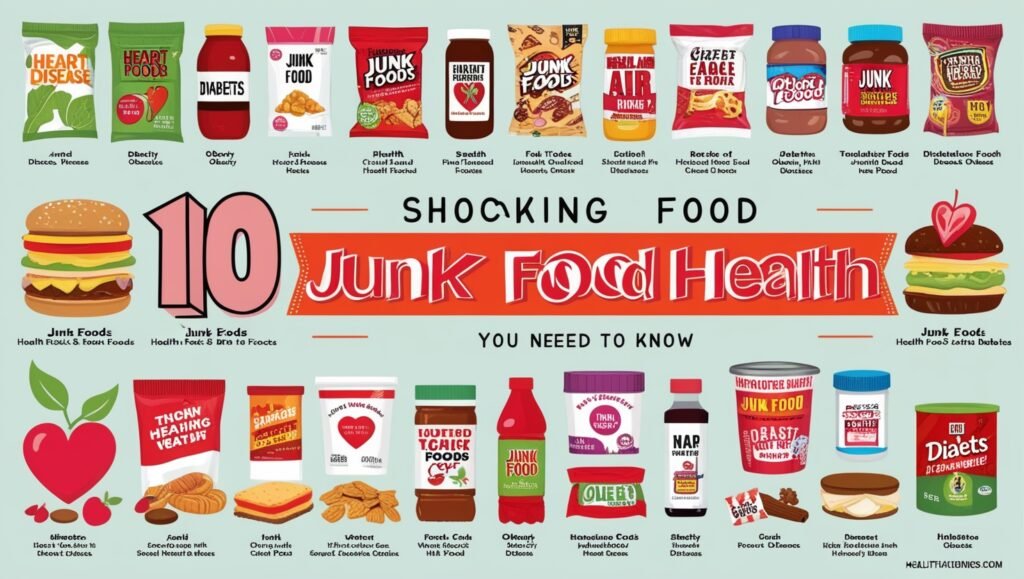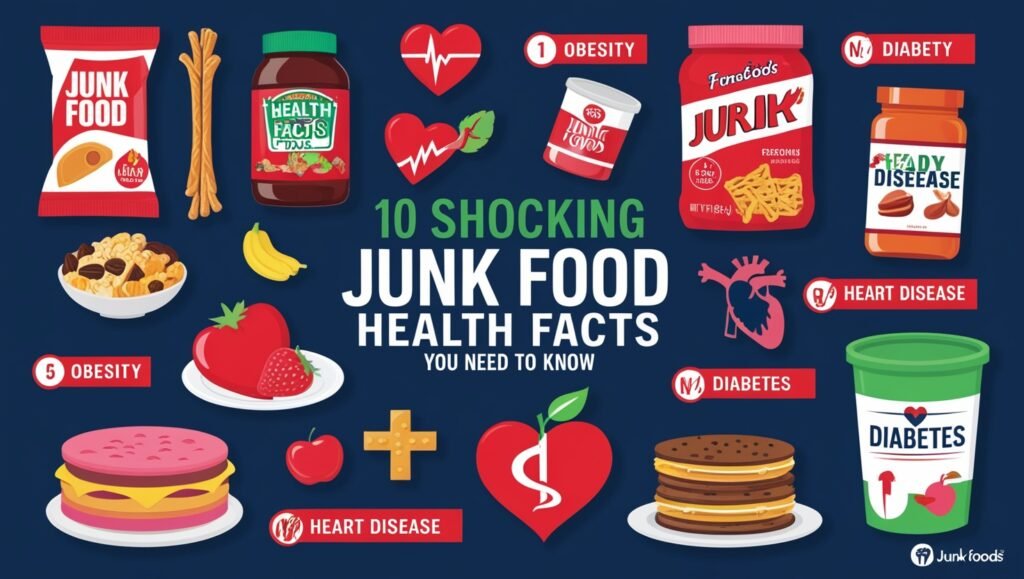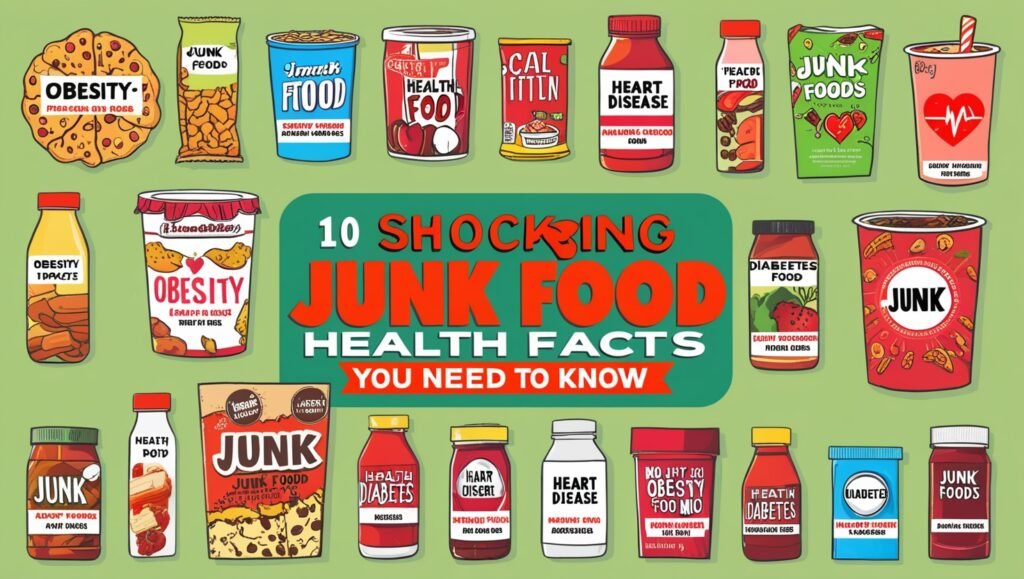
“10 Shocking Junk Food Health Facts”
“10 Shocking Junk Food Health Facts”
“Discover 10 shocking health facts about junk food and its impact on your body. Learn how junk food affects your health and why you should limit its intake.”


Introduction
Read also: “Flowers: 5 Shocking Medicinal Properties”
Brief Overview of Junk Food
Junk food refers to foods that are high in calories but low in nutritional value. These foods are typically rich in unhealthy fats, sugars, and salt, and include items such as fast food, sugary snacks, and processed foods. While they may be convenient and tasty, junk foods offer little to no health benefits and can have serious negative effects on the body.
Importance of Understanding the Health Risks Associated with Junk Food
Understanding the health risks associated with junk food is crucial for making informed dietary choices. Consuming junk food regularly can lead to a range of health problems, including obesity, heart disease, diabetes, and more. By being aware of these risks, individuals can take steps to reduce their intake of junk food and adopt healthier eating habits.
Fact 1: Increases Risk of Obesity
Explanation of How Junk Food Contributes to Obesity
Junk food is typically high in calories, unhealthy fats, and sugars, which can contribute to weight gain and obesity. These foods are often low in fiber and other essential nutrients, leading to overeating and poor satiety. The high-calorie content combined with low nutritional value makes it easy to consume excess calories without feeling full, leading to weight gain over time.
Statistics on Obesity Rates Linked to Junk Food Consumption
Numerous studies have shown a strong correlation between junk food consumption and rising obesity rates. For example, research has found that individuals who frequently consume fast food are more likely to be overweight or obese compared to those who eat it less often. The prevalence of obesity has increased significantly in recent decades, with junk food being a major contributing factor.
Long-Term Health Consequences of Obesity
Obesity is associated with a range of serious health problems, including:
- Heart Disease: Increased risk of heart attacks, strokes, and other cardiovascular issues.
- Type 2 Diabetes: Higher likelihood of developing insulin resistance and diabetes.
- Joint Problems: Increased pressure on joints, leading to conditions like osteoarthritis.
- Sleep Apnea: Greater risk of sleep disorders due to excess weight.
- Certain Cancers: Higher risk of cancers such as breast, colon, and endometrial cancer.

Fact 2: Leads to Heart Disease
Impact of High-Fat and High-Sugar Content on Heart Health
Junk food is often high in unhealthy fats (such as trans fats and saturated fats) and sugars, which can negatively impact heart health. These components can lead to increased cholesterol levels, high blood pressure, and inflammation, all of which are risk factors for heart disease. Consuming junk food regularly can contribute to the buildup of plaque in the arteries, leading to atherosclerosis and other cardiovascular problems.
Studies Linking Junk Food to Cardiovascular Diseases
Several studies have established a link between junk food consumption and an increased risk of cardiovascular diseases. For instance, research has shown that individuals who consume high amounts of fast food and sugary beverages have a higher risk of developing heart disease compared to those who consume these foods less frequently. The high levels of unhealthy fats and sugars in junk food contribute to the development of cardiovascular issues.
Prevention Tips to Reduce Heart Disease Risk
To reduce the risk of heart disease, it is important to limit the intake of junk food and adopt a heart-healthy diet. Here are some tips:
- Choose Healthy Fats: Opt for sources of healthy fats, such as avocados, nuts, and olive oil, instead of trans fats and saturated fats.
- Reduce Sugar Intake: Limit the consumption of sugary beverages and snacks, and choose natural sweeteners like fruits.
- Eat More Whole Foods: Incorporate more fruits, vegetables, whole grains, and lean proteins into your diet.
- Stay Active: Engage in regular physical activity to maintain a healthy weight and support heart health.
- Monitor Portion Sizes: Be mindful of portion sizes to avoid overeating and consuming excess calories.

Fact 3: Causes Type 2 Diabetes
How Junk Food Affects Blood Sugar Levels
Junk food is often high in refined sugars and simple carbohydrates, which can cause rapid spikes in blood sugar levels. These sudden increases in blood sugar can lead to insulin resistance over time, where the body’s cells become less responsive to insulin. This condition makes it difficult for the body to regulate blood sugar levels, increasing the risk of developing type 2 diabetes.
Connection Between Junk Food and Insulin Resistance
Insulin resistance is a key factor in the development of type 2 diabetes. Consuming junk food regularly can lead to weight gain and increased fat accumulation, particularly around the abdomen. This excess fat can interfere with the body’s ability to use insulin effectively, leading to higher blood sugar levels and eventually, type 2 diabetes.
Strategies to Prevent Diabetes Through Diet
To prevent diabetes, it is important to adopt a healthy diet that minimizes the intake of junk food. Here are some strategies:
- Choose Whole Foods: Opt for whole grains, fruits, vegetables, lean proteins, and healthy fats.
- Limit Sugary Foods and Drinks: Reduce the consumption of sugary snacks, sodas, and processed foods.
- Monitor Portion Sizes: Be mindful of portion sizes to avoid overeating.
- Stay Hydrated: Drink plenty of water and avoid sugary beverages.
- Regular Physical Activity: Engage in regular exercise to maintain a healthy weight and improve insulin sensitivity.
Fact 4: Damages Liver Function
Effects of Junk Food on Liver Health
Junk food can have detrimental effects on liver health. The high levels of unhealthy fats and sugars in junk food can lead to the accumulation of fat in the liver, causing non-alcoholic fatty liver disease (NAFLD). This condition can progress to more serious liver problems, such as inflammation, fibrosis, and cirrhosis.
Research on Fatty Liver Disease Caused by Junk Food
Studies have shown a strong link between junk food consumption and the development of fatty liver disease. Research indicates that individuals who consume high amounts of junk food are more likely to develop NAFLD compared to those who follow a balanced diet. The excessive intake of unhealthy fats and sugars in junk food contributes to fat buildup in the liver, leading to liver damage over time.
Ways to Protect Liver Health
To protect liver health, it is important to limit the intake of junk food and adopt a liver-friendly diet. Here are some tips:
- Eat a Balanced Diet: Include plenty of fruits, vegetables, whole grains, and lean proteins in your diet.
- Limit Unhealthy Fats and Sugars: Reduce the consumption of foods high in unhealthy fats and sugars.
- Stay Hydrated: Drink plenty of water to support liver function.
- Exercise Regularly: Engage in regular physical activity to maintain a healthy weight and reduce fat accumulation in the liver.
- Avoid Alcohol: Limit alcohol consumption to prevent additional liver damage.
Fact 5: Increases Cancer Risk
Carcinogenic Compounds Found in Junk Food
Certain junk foods contain carcinogenic compounds that can increase the risk of cancer. These compounds can form during the processing and cooking of junk food, such as acrylamide in fried foods and polycyclic aromatic hydrocarbons (PAHs) in grilled meats. Additionally, the high levels of unhealthy fats, sugars, and additives in junk food can contribute to cancer development.
Studies Linking Junk Food to Various Types of Cancer
Research has shown a correlation between junk food consumption and an increased risk of various types of cancer. For example, studies have found that individuals who consume high amounts of processed and fried foods have a higher risk of developing colorectal, breast, and prostate cancer. The carcinogenic compounds and unhealthy ingredients in junk food contribute to the development and progression of cancer.
Dietary Changes to Reduce Cancer Risk
To reduce the risk of cancer, it is important to make dietary changes that minimize the intake of junk food. Here are some recommendations:
- Eat a Plant-Based Diet: Include plenty of fruits, vegetables, whole grains, and legumes in your diet.
- Limit Processed and Fried Foods: Reduce the consumption of processed meats, fried foods, and sugary snacks.
- Choose Healthy Cooking Methods: Opt for baking, steaming, or grilling instead of frying.
- Avoid Additives and Preservatives: Choose whole, unprocessed foods without artificial additives and preservatives.
- Maintain a Healthy Weight: Engage in regular physical activity and follow a balanced diet to maintain a healthy weight.
Fact 6: Weakens Immune System
How Junk Food Affects Immune Function
Junk food can weaken the immune system by causing nutrient deficiencies and promoting inflammation. The high levels of unhealthy fats, sugars, and additives in junk food can disrupt the balance of gut bacteria, which plays a crucial role in immune function. Additionally, the lack of essential nutrients in junk food can impair the body’s ability to fight off infections and diseases.
Nutrient Deficiencies Caused by Junk Food
Consuming junk food regularly can lead to deficiencies in essential nutrients, such as vitamins A, C, D, and E, as well as zinc and selenium. These nutrients are vital for maintaining a healthy immune system. The lack of these nutrients can weaken the immune response, making the body more susceptible to infections and illnesses.
Tips to Boost Immunity Through a Healthy Diet
To boost immunity and protect against infections, it is important to follow a healthy diet that minimizes the intake of junk food. Here are some tips:
- Eat a Variety of Nutrient-Rich Foods: Include a wide range of fruits, vegetables, whole grains, lean proteins, and healthy fats in your diet.
- Stay Hydrated: Drink plenty of water to support immune function.
- Limit Unhealthy Fats and Sugars: Reduce the consumption of foods high in unhealthy fats and sugars.
- Include Probiotic Foods: Consume foods rich in probiotics, such as yogurt, kefir, and fermented vegetables, to support gut health.
- Get Enough Sleep: Ensure you get adequate sleep to support immune function and overall health.
Fact 7: Causes Digestive Issues
Impact of Junk Food on Digestive Health
Junk food can have a significant negative impact on digestive health. These foods are often high in unhealthy fats, sugars, and artificial additives, which can disrupt the normal functioning of the digestive system. The lack of dietary fiber in junk food can lead to poor digestion and various gastrointestinal issues.
Common Digestive Problems Linked to Junk Food
Consuming junk food regularly can lead to several digestive problems, including:
- Constipation: The low fiber content in junk food can slow down bowel movements, leading to constipation.
- Bloating: High levels of sodium in junk food can cause water retention and bloating.
- Acid Reflux: Fatty and spicy junk foods can trigger acid reflux and heartburn.
- Indigestion: The high fat content in junk food can slow down digestion, causing discomfort and indigestion.
Solutions to Improve Digestive Health
To improve digestive health and mitigate the negative effects of junk food, consider the following solutions:
- Increase Fiber Intake: Incorporate more fiber-rich foods, such as fruits, vegetables, whole grains, and legumes, into your diet.
- Stay Hydrated: Drink plenty of water to support digestion and prevent constipation.
- Limit Junk Food: Reduce the consumption of junk food and opt for healthier alternatives.
- Eat Smaller, Frequent Meals: Eating smaller, more frequent meals can help improve digestion and prevent overeating.
- Exercise Regularly: Physical activity can help stimulate digestion and promote regular bowel movements.
Fact 8: Affects Mental Health
Connection Between Junk Food and Mental Health Disorders
There is a growing body of evidence suggesting a link between junk food consumption and mental health disorders. Diets high in junk food have been associated with an increased risk of depression, anxiety, and other mental health issues. The lack of essential nutrients in junk food can negatively affect brain function and mood regulation.
Studies on Junk Food and Depression, Anxiety
Several studies have found a correlation between junk food consumption and mental health disorders. For example, research has shown that individuals who consume high amounts of junk food are more likely to experience symptoms of depression and anxiety compared to those who follow a balanced diet. The high levels of unhealthy fats, sugars, and additives in junk food can contribute to inflammation and oxidative stress, which are linked to mental health issues.
Mental Health Benefits of a Balanced Diet
Adopting a balanced diet that includes a variety of nutrient-rich foods can have significant mental health benefits. Here are some ways a balanced diet can improve mental health:
- Improved Mood: Nutrient-dense foods, such as fruits, vegetables, whole grains, and lean proteins, can help regulate mood and reduce symptoms of depression and anxiety.
- Enhanced Cognitive Function: Essential nutrients, such as omega-3 fatty acids, vitamins, and minerals, support brain health and cognitive function.
- Reduced Inflammation: A balanced diet can help reduce inflammation and oxidative stress, which are linked to mental health disorders.
- Better Stress Management: Consuming a variety of healthy foods can provide the energy and nutrients needed to cope with stress effectively.
Fact 9: Leads to Poor Dental Health
Effects of Sugary Junk Food on Teeth
Sugary junk food can have detrimental effects on dental health. The high sugar content in these foods can lead to the formation of plaque, which can cause tooth decay and cavities. Additionally, acidic junk foods can erode tooth enamel, making teeth more susceptible to damage and decay.
Statistics on Dental Problems Caused by Junk Food
Research has shown that individuals who consume high amounts of sugary junk food are more likely to experience dental problems. For example, studies have found that children and adolescents who frequently consume sugary snacks and beverages have a higher risk of developing cavities and other dental issues compared to those who consume these foods less often.
Oral Hygiene Tips to Prevent Dental Issues
To prevent dental issues caused by junk food, consider the following oral hygiene tips:
- Brush and Floss Regularly: Brush your teeth at least twice a day and floss daily to remove plaque and food particles.
- Limit Sugary Foods and Drinks: Reduce the consumption of sugary snacks and beverages to prevent tooth decay.
- Use Fluoride Toothpaste: Fluoride helps strengthen tooth enamel and prevent cavities.
- Visit the Dentist Regularly: Schedule regular dental check-ups and cleanings to maintain good oral health.
- Drink Water: Drinking water, especially after consuming sugary foods, can help wash away sugars and acids, reducing the risk of tooth decay.
Fact 10: Contributes to Skin Problems
How Junk Food Affects Skin Health
Junk food can have a significant negative impact on skin health. The high levels of unhealthy fats, sugars, and artificial additives in junk food can lead to inflammation and hormonal imbalances, which can manifest as various skin problems. Additionally, the lack of essential nutrients in junk food can deprive the skin of the vitamins and minerals it needs to stay healthy and radiant.
Common Skin Issues Linked to Junk Food
Consuming junk food regularly can lead to several skin issues, including:
- Acne: High sugar and fat content in junk food can increase oil production and clog pores, leading to acne breakouts.
- Dry Skin: Lack of essential fatty acids and vitamins in junk food can result in dry, flaky skin.
- Premature Aging: The presence of free radicals and lack of antioxidants in junk food can accelerate the aging process, causing wrinkles and fine lines.
- Inflammation: Junk food can trigger inflammatory responses in the body, leading to redness, swelling, and other skin irritations.
Skincare Tips to Maintain Healthy Skin
To maintain healthy skin and mitigate the negative effects of junk food, consider the following skincare tips:
- Eat a Balanced Diet: Incorporate a variety of nutrient-rich foods, such as fruits, vegetables, whole grains, and lean proteins, into your diet to provide your skin with essential vitamins and minerals.
- Stay Hydrated: Drink plenty of water to keep your skin hydrated and flush out toxins.
- Limit Junk Food: Reduce the consumption of junk food and opt for healthier alternatives.
- Use Skincare Products with Antioxidants: Choose skincare products that contain antioxidants, such as vitamin C and E, to protect your skin from free radical damage.
- Practice Good Skincare Habits: Cleanse your skin regularly, use sunscreen, and moisturize daily to maintain healthy, glowing skin.
Conclusion
Recap of the 10 Shocking Health Facts About Junk Food
To summarize, junk food can have a range of detrimental effects on your health, including:
- Increases Risk of Obesity: High in calories, unhealthy fats, and sugars, leading to weight gain and obesity.
- Leads to Heart Disease: Contributes to high cholesterol, high blood pressure, and inflammation, increasing the risk of cardiovascular diseases.
- Causes Type 2 Diabetes: High in refined sugars and simple carbohydrates, leading to insulin resistance and diabetes.
- Damages Liver Function: High levels of unhealthy fats and sugars can cause fatty liver disease and liver damage.
- Increases Cancer Risk: Contains carcinogenic compounds and unhealthy ingredients that can increase the risk of various cancers.
- Weakens Immune System: Causes nutrient deficiencies and promotes inflammation, weakening the immune system.
- Causes Digestive Issues: High in unhealthy fats, sugars, and additives, leading to constipation, bloating, acid reflux, and indigestion.
- Affects Mental Health: Linked to an increased risk of depression, anxiety, and other mental health disorders.
- Leads to Poor Dental Health: High sugar content can cause tooth decay, cavities, and other dental problems.
- Contributes to Skin Problems: Causes acne, dry skin, premature aging, and inflammation.
Encouragement to Limit Junk Food Intake for Better Health
Limiting your intake of junk food and adopting a balanced, nutrient-rich diet can significantly improve your overall health and well-being. By making healthier food choices, you can reduce the risk of various health problems, maintain a healthy weight, and enjoy better physical and mental health. Embrace a healthier lifestyle and experience the positive changes it brings to your life.
FAQs
- What are the health risks of eating junk food?
- Junk food can lead to obesity, heart disease, type 2 diabetes, liver damage, cancer, weakened immune system, digestive issues, mental health disorders, poor dental health, and skin problems.
- How does junk food contribute to obesity?
- Junk food is high in calories, unhealthy fats, and sugars, which can lead to weight gain and obesity when consumed in excess.
- Can junk food cause heart disease?
- Yes, the high-fat and high-sugar content in junk food can increase the risk of cardiovascular diseases by raising cholesterol levels and causing inflammation.
- What is the connection between junk food and type 2 diabetes?
- Junk food can cause insulin resistance and high blood sugar levels, leading to an increased risk of developing type 2 diabetes.
- How does junk food affect liver health?
- Consuming junk food can lead to fatty liver disease and liver damage due to the accumulation of unhealthy fats in the liver.
- Is there a link between junk food and cancer?
- Some studies have found that certain carcinogenic compounds in junk food can increase the risk of various types of cancer.
- How does junk food weaken the immune system?
- Junk food can cause nutrient deficiencies and inflammation, which can weaken the immune system and make the body more susceptible to infections.
- What digestive issues are caused by junk food?
- Junk food can lead to digestive problems such as constipation, bloating, and acid reflux due to its low fiber content and high fat content.
- Can junk food affect mental health?
- Yes, studies have shown that a diet high in junk food can increase the risk of mental health disorders such as depression and anxiety.
- How does junk food impact dental health?
- The high sugar content in junk food can lead to tooth decay, cavities, and other dental problems.


